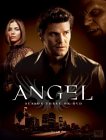| Reviews & Columns |
|
Reviews DVD TV on DVD Blu-ray 4K UHD International DVDs In Theaters Reviews by Studio Video Games Features Collector Series DVDs Easter Egg Database Interviews DVD Talk Radio Feature Articles Columns Anime Talk DVD Savant Horror DVDs The M.O.D. Squad Art House HD Talk Silent DVD
|
DVD Talk Forum |
|
|
| Resources |
|
DVD Price Search Customer Service #'s RCE Info Links |
|
Columns
|
|
|
Angel - Season Three
Fox // Unrated // February 10, 2004
List Price: $59.98 [Buy now and save at Amazon]
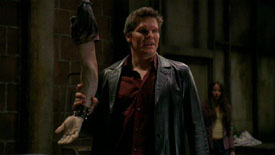 Angel first began to step outside the daunting shadow of Buffy the Vampire Slayer in its second year. In its third season, Angel eclipsed its sister series in every respect, propelled by a story arc that runs for the entire length of the season and continues to have an indelible effect on the series today. This box set collects all twenty-two episodes of Angel's third season, including Heartthrob, That Vision Thing, That Old Gang of Mine, Carpe Noctem, Fredless, Billy, Offspring, Quickening, Lullaby, Dad, Birthday, Provider, Waiting in the Wings, Couplet, Loyalty, Sleep Tight, Forgiving, Double or Nothing, The Price, A New World, Benediction, and Tomorrow. The season reintroduces Captain Daniel Holtz, a wronged man whose insatiable thirst for vengeance transcends the many years that have passed since his family's death at the hands of Darla and Angelus. Darla herself returns as well, with an impossible surprise in tow. This collision of past and present, combined with related prophecies and their blood-soaked implications, sets up the framework for much of the season. For viewers being introduced to these episodes for the first time, season three is a virtual dramatic rollercoaster, with an impressively elaborate arc and numerous unexpected twists and jolts. Aside from the primary arc, other stories touched on throughout the course of the season include a grieving companion from Angel's past, the increasing toll of Cordelia's visions, lecherous body-hopping, an eerily-effective retread of The Shining, an obligatory Cordelia Elseworlds tale, better living through aggressive marketing, the literally timeless quality of ballet, ripping a hole in the fabric of reality, collecting on a sold soul, the repercussions of dark magics, heartfelt reunions, abandonment, and betrayal.
Angel first began to step outside the daunting shadow of Buffy the Vampire Slayer in its second year. In its third season, Angel eclipsed its sister series in every respect, propelled by a story arc that runs for the entire length of the season and continues to have an indelible effect on the series today. This box set collects all twenty-two episodes of Angel's third season, including Heartthrob, That Vision Thing, That Old Gang of Mine, Carpe Noctem, Fredless, Billy, Offspring, Quickening, Lullaby, Dad, Birthday, Provider, Waiting in the Wings, Couplet, Loyalty, Sleep Tight, Forgiving, Double or Nothing, The Price, A New World, Benediction, and Tomorrow. The season reintroduces Captain Daniel Holtz, a wronged man whose insatiable thirst for vengeance transcends the many years that have passed since his family's death at the hands of Darla and Angelus. Darla herself returns as well, with an impossible surprise in tow. This collision of past and present, combined with related prophecies and their blood-soaked implications, sets up the framework for much of the season. For viewers being introduced to these episodes for the first time, season three is a virtual dramatic rollercoaster, with an impressively elaborate arc and numerous unexpected twists and jolts. Aside from the primary arc, other stories touched on throughout the course of the season include a grieving companion from Angel's past, the increasing toll of Cordelia's visions, lecherous body-hopping, an eerily-effective retread of The Shining, an obligatory Cordelia Elseworlds tale, better living through aggressive marketing, the literally timeless quality of ballet, ripping a hole in the fabric of reality, collecting on a sold soul, the repercussions of dark magics, heartfelt reunions, abandonment, and betrayal. Season three of Angel aired alongside the sixth season of Buffy, and unlike its previous years, the series exists entirely on its own, free of any crossovers or transplanted characters. There are only a few direct mentions of Buffy, one of which is a mocking re-enactment of the star-crossed title characters' relationship by Cordelia and Wesley. It's interesting to contrast these seasons of both series. Buffy became unrelentingly dark in its sixth season. Its supporting characters were shuffled into the background, the quality of the writing began to slip, it became less effective at maintaining a momentum for the length of the season, and it began dabbling in heavy-handed, afterschool-special metaphors. Angel accomplishes what Buffy once managed so deftly, intermingling comedy with the drama and centering the series around a cast of characters I genuinely care about. Actions have consequences, and not the superficial sort that exist solely to fill a plot for an episode or two. One random example -- in season six of Buffy, one of the central characters toys carelessly with magic and is directly responsible for the demise of several innocent people. This character is fully aware of these casualties yet doesn't bother to inform anyone of the cause of the havoc to stave off further needless deaths. When the secret is revealed, the most this character can offer is an "oops!", and all is immediately forgiven. On the opposite end of the spectrum is Angel. One betrayal in particular this season has long-lasting consequences. The structure of the group in its premiere remains altered from the season preceding it, and season four would still be reeling from decisions made here.
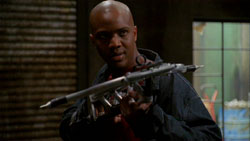 It's the strengths of Angel's characters that form the foundation of the series. The central characters aren't inseparable friends, and there is considerable tension in the ranks. Each character receives ample attention, an approach abandoned by the concurrently-airing season of Buffy and later by Angel in its fifth season. Lorne's sole purpose in the current season is to pop on-screen once an episode to spout off a cute line or two, but in season three, he's an integral part of the group despite the lack of billing in the opening credits. I could barely tolerate Lorne in season two, but he became much more endearing in the season that would follow. In one of the season's most memorable moments, Lorne inadvertently finds himself standing in the way of betrayal within the group, and the responses of both actors, the attack that ensues, and the cavalier response of one when the assault is nearly discovered is one of many individual moments I'd point to that contribute to the greatness of this season. Fred Burkle (Amy Acker) is impossibly cute, and if I were the type of person to have crushes on television characters, which I am but wouldn't care to admit to in the course of a DVD review, it'd be on someone strikingly similar to her. The response to Fred has been largely tepid on the message boards I read -- her all-encompassing knowledge of seemingly everything, everyone in sight fawning over her, the correlation between insanity and a Southern-fried accent, and, he types with a shudder, pancake kisses -- but I thought she made for a solid addition to the Angel Investigations team. For much of the season, Cordelia strikes the balance between the smarminess on her days of Buffy and the responsibility and maturity gained on Angel. Too bad her character would be eviscerated -- not literally -- the following season, a progression that begins in the later moments in these episodes. There's one cast member in particular that I think makes Angel worth watching, and it's not the man behind its title character. No, I'd point to Alexis Denisof, perhaps the strongest and most versatile actor of the main bunch. Cordelia has evolved since her run on Buffy, but Wesley has progressed to an even greater extent. The backbone of the group, Wesley is intensely driven and focused, poring over ancient prophecies and threatening everything he knows and loves to do what's right. Denisof is able to convey so much with nothing more than a bedridden glance. Angel spends much of the season being giddier and goofier than in the series' other seasons, but that makes the shift in tone that eventually comes all the more satisfying.
It's the strengths of Angel's characters that form the foundation of the series. The central characters aren't inseparable friends, and there is considerable tension in the ranks. Each character receives ample attention, an approach abandoned by the concurrently-airing season of Buffy and later by Angel in its fifth season. Lorne's sole purpose in the current season is to pop on-screen once an episode to spout off a cute line or two, but in season three, he's an integral part of the group despite the lack of billing in the opening credits. I could barely tolerate Lorne in season two, but he became much more endearing in the season that would follow. In one of the season's most memorable moments, Lorne inadvertently finds himself standing in the way of betrayal within the group, and the responses of both actors, the attack that ensues, and the cavalier response of one when the assault is nearly discovered is one of many individual moments I'd point to that contribute to the greatness of this season. Fred Burkle (Amy Acker) is impossibly cute, and if I were the type of person to have crushes on television characters, which I am but wouldn't care to admit to in the course of a DVD review, it'd be on someone strikingly similar to her. The response to Fred has been largely tepid on the message boards I read -- her all-encompassing knowledge of seemingly everything, everyone in sight fawning over her, the correlation between insanity and a Southern-fried accent, and, he types with a shudder, pancake kisses -- but I thought she made for a solid addition to the Angel Investigations team. For much of the season, Cordelia strikes the balance between the smarminess on her days of Buffy and the responsibility and maturity gained on Angel. Too bad her character would be eviscerated -- not literally -- the following season, a progression that begins in the later moments in these episodes. There's one cast member in particular that I think makes Angel worth watching, and it's not the man behind its title character. No, I'd point to Alexis Denisof, perhaps the strongest and most versatile actor of the main bunch. Cordelia has evolved since her run on Buffy, but Wesley has progressed to an even greater extent. The backbone of the group, Wesley is intensely driven and focused, poring over ancient prophecies and threatening everything he knows and loves to do what's right. Denisof is able to convey so much with nothing more than a bedridden glance. Angel spends much of the season being giddier and goofier than in the series' other seasons, but that makes the shift in tone that eventually comes all the more satisfying. Holtz is one of the greatest adversaries throughout the entire run of Buffy or Angel. Few suffered more throughout Angelus's reign of terror than Holtz, who is, in a way, one of the good guys. A character who's willing to go to any length to do what he thinks is right is much more compelling than comic book-flavored evil. Holtz' sole motivating factor -- not limited to his actions throughout the course of the season, but in his very existence -- is revenge. As much as I gush over Mayor Wilkins, his end goal is tougher to appreciate than a vengeful man whose family was mercilessly seized from him. Another antagonist presented in an unconventional light is Darla, who appears in a form both physically and mentally differing from her previous appearances since Buffy's inception.
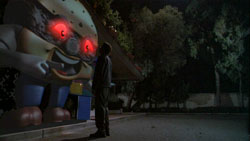 In a series like Angel, I'd expect the moments that stand out the most in my mind to be epic battles where the fate of humanity lies in the balance. It's actually the smaller, individual moments -- sometimes just an offhand exchange or a sudden, shocking event, the latter being particularly prevalent throughout the season. Because of the highly serial nature of the series, I can't cite any specific examples without spoiling anything for uninitiated viewers, but betrayal, self-sacrifice (both literally and figuratively), heartbreak, passion, and the courage of one's convictions are dominant throughout the season. Like Buffy in its early years, Angel is capable of balancing those elements with humor without it coming across as forced or unnatural. "Carpe Noctum" in particular had me laughing out loud more frequently than any Buffy or Angel episode I can recall offhand, showcasing the comedic strengths of David Boreanaz. There's also the blending of the absurd, such as an impassioned argument about an ancient prophecy with a giant hamburger. They're integrated surprisingly seamlessly and don't dull the effectiveness of the many shocking moments throughout the season, and when I rattle off words like "many" and "shocking", it's not standard issue net.reviewer hyperbole.
In a series like Angel, I'd expect the moments that stand out the most in my mind to be epic battles where the fate of humanity lies in the balance. It's actually the smaller, individual moments -- sometimes just an offhand exchange or a sudden, shocking event, the latter being particularly prevalent throughout the season. Because of the highly serial nature of the series, I can't cite any specific examples without spoiling anything for uninitiated viewers, but betrayal, self-sacrifice (both literally and figuratively), heartbreak, passion, and the courage of one's convictions are dominant throughout the season. Like Buffy in its early years, Angel is capable of balancing those elements with humor without it coming across as forced or unnatural. "Carpe Noctum" in particular had me laughing out loud more frequently than any Buffy or Angel episode I can recall offhand, showcasing the comedic strengths of David Boreanaz. There's also the blending of the absurd, such as an impassioned argument about an ancient prophecy with a giant hamburger. They're integrated surprisingly seamlessly and don't dull the effectiveness of the many shocking moments throughout the season, and when I rattle off words like "many" and "shocking", it's not standard issue net.reviewer hyperbole. Like many Mutant Enemy seasons, season three of Angel drags in the middle. Much of the criticism of this particular era centers around a newly-introduced character, which, in a well-intentioned attempt to avoid spoilers, I'm unable to describe in anything approximating detail. Although most of the distaste revolves around this character's most frequently seen form, it's the initial incarnation -- or more accurately, the others' reception to him -- that bugs me the most. The tedious "Dad", the worst of these episodes, begins a string of mediocrity that would last through "Couplet". Because there are so many intertwining stories and a multilayered season arc, the slower moments don't decelerate the pacing of the season excessively, and even in the episodes that aren't as interesting when examined individually, there are still shining moments that help redeem them at least in part.
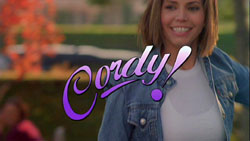 I could point to other flaws, though they do little to dull my enthusiasm for this season. I wasn't fond of the incessant coupling, for one. Lorne aside, everyone in the group becomes romantically entangled or desperately wants to be, and the objects of their affections rarely reside outside the Hyperion. The worst of the romances thankfully doesn't become dominant until the season finalé approaches, poorly conceived and entirely unconvincing. The opening battle of "A New World" makes it apparent that James A. Contner wasn't the only Buffyverse director to be hopelessly smitten with The Matrix. "Double or Nothing", which dukes it out for "Dad" as the worst of the season, is laughably misplaced, although I understand what its timing was intended to achieve. Gunn's speech to Angel in "This Old Gang of Mine" is apparently quickly forgotten, judging by the teaser in the following episode. Some of the metaphors are clunky -- the "misogyny is bad!" in "Billy" and "racism is bad!" in "This Old Gang of Mine" -- but even if they're not spectacular conceptually, they're executed well, due primarily to the interaction between the characters. Sure, the writing is sharp, the cinematography is first-rate, the design of the monsters is often inventive, and the fight scenes are impressively choreographed, but it's the interaction between the series' character that makes Angel what it is (or at least was, up until the disappointing fifth season airing now) -- one of the best and most underrated dramas on television.
I could point to other flaws, though they do little to dull my enthusiasm for this season. I wasn't fond of the incessant coupling, for one. Lorne aside, everyone in the group becomes romantically entangled or desperately wants to be, and the objects of their affections rarely reside outside the Hyperion. The worst of the romances thankfully doesn't become dominant until the season finalé approaches, poorly conceived and entirely unconvincing. The opening battle of "A New World" makes it apparent that James A. Contner wasn't the only Buffyverse director to be hopelessly smitten with The Matrix. "Double or Nothing", which dukes it out for "Dad" as the worst of the season, is laughably misplaced, although I understand what its timing was intended to achieve. Gunn's speech to Angel in "This Old Gang of Mine" is apparently quickly forgotten, judging by the teaser in the following episode. Some of the metaphors are clunky -- the "misogyny is bad!" in "Billy" and "racism is bad!" in "This Old Gang of Mine" -- but even if they're not spectacular conceptually, they're executed well, due primarily to the interaction between the characters. Sure, the writing is sharp, the cinematography is first-rate, the design of the monsters is often inventive, and the fight scenes are impressively choreographed, but it's the interaction between the series' character that makes Angel what it is (or at least was, up until the disappointing fifth season airing now) -- one of the best and most underrated dramas on television. Video: The third season of Angel debuted at an aspect ratio of 1.78:1, one of just a handful of fully letterboxed television series at the time. Although subsequent airings of these episodes on TNT have been mercilessly cropped, the DVD set preserves the series' intended aspect ratio in anamorphic widescreen. The presentation of these twenty-two episodes is excellent, offering an impressive level of detail. The contrast between light and dark is as significant to Angel visually as it is figuratively, and this season is darker than those of the previous two years in both respects. Shadow delineation and the strength of the black levels are both striking. Despite the presence of such darkness, the image never devolves into an indistinguishable, murky mess. Blacks sometimes do run together but rarely at the expense of necessary detail. One of the only instances I can think of where detail was obscured was in the episode "Birthday" when Cordelia peels back wallpaper to reveal a message scrawled in magic marker. Though I can't claim to have vivid memories of a television broadcast from two years ago, I feel fairly certain that I was able to clearly discern that address when the episode originally aired, but on the DVD, the message was indistinguishable from the extremely dark background, diminishing the intended effect of that shot. This sort of occurrence was rare and not at all pervasive throughout the season. As many times as I've used variations of the word 'dark' in the past few sentences, the cinematography isn't hopelessly bleak as that would suggest. One of the most visually appealing aspects of the series is that the image is so colorful (frequently thanks to the green hues of Lorne's makeup and the vibrant hues of his clothing) and bathed in so many shadows. The source material is predictably in excellent shape, with no visible wear, speckling, or even the mild film grain so frequently spotted on television box sets. The authoring is also largely handled well, although certain shots of whiteboards and a glimpse at a stack of money near the end of "Provider" have a strangely unstable appearance. Some slight aliasing was spotted infrequently as well. Such concerns are exceedingly minor, and continuing where the previous boxset left off, this season of Angel easily stands out as one of the best-looking TV-on-DVD releases to date.
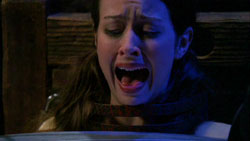 Audio: The Dolby Digital stereo surround audio, encoded at the standard bitrate of 192Kbps, doesn't fare quite as well. The visuals are a substantial leap over broadcast quality, but the audio remains closer to an appearance on television. There's a decent amount of surround activity, most noticeably in the roar that accompanies the rapid fire shot-on-video montages used to separate scenes. The lower frequencies are at times surprisingly light: one episode late in the season features a bombastic car chase and a series of explosions, but the level of bass is inexplicably anemic. Dialogue is discernable throughout, although small portions sounded lightly clipped. Also, because the "previously on..."s have been lopped off, some episodes begin with part of the score excised, and apparently the commentaries have been edited down as a result as well. It's disappointing that the DVD doesn't take better advantage of the capabilities of the format, but using television as a baseline, Angel sounds fine, neither noticeably superior or inferior to what I'd expect from a broadcast.
Audio: The Dolby Digital stereo surround audio, encoded at the standard bitrate of 192Kbps, doesn't fare quite as well. The visuals are a substantial leap over broadcast quality, but the audio remains closer to an appearance on television. There's a decent amount of surround activity, most noticeably in the roar that accompanies the rapid fire shot-on-video montages used to separate scenes. The lower frequencies are at times surprisingly light: one episode late in the season features a bombastic car chase and a series of explosions, but the level of bass is inexplicably anemic. Dialogue is discernable throughout, although small portions sounded lightly clipped. Also, because the "previously on..."s have been lopped off, some episodes begin with part of the score excised, and apparently the commentaries have been edited down as a result as well. It's disappointing that the DVD doesn't take better advantage of the capabilities of the format, but using television as a baseline, Angel sounds fine, neither noticeably superior or inferior to what I'd expect from a broadcast. Angel is closed-captioned, featuring stereo surround dubs in French and Spanish as well as subtitles in English and Spanish.
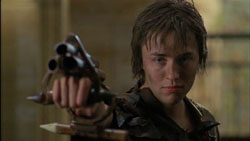 Supplements: The first of the DVD's commentaries pairs Tim Minear and Jeffrey Bell on disc two's "Billy". Despite the claim at one point that "the lamest commentary in the history of commentaries", it's a blast: Minear and Bell have a great rapport, constantly quipping while maintaining a steady flow of background information. Minear groans about "That Old Gang of Mine", improving upon his previous commentary for the blind and using a bassier speaking voice, Angel's predilection towards empty threats, Billy's unspoken heritage, a set that's really not at all from Saved by the Bell, and the potential problems September 11th could have posed.
Supplements: The first of the DVD's commentaries pairs Tim Minear and Jeffrey Bell on disc two's "Billy". Despite the claim at one point that "the lamest commentary in the history of commentaries", it's a blast: Minear and Bell have a great rapport, constantly quipping while maintaining a steady flow of background information. Minear groans about "That Old Gang of Mine", improving upon his previous commentary for the blind and using a bassier speaking voice, Angel's predilection towards empty threats, Billy's unspoken heritage, a set that's really not at all from Saved by the Bell, and the potential problems September 11th could have posed. Moving onto disc three, "Darla: Deliver Us From Evil" (12:38) takes a look at the life and many deaths of Darla, driven by lengthy comments from Julie Benz and clips from her appearances on both Buffy the Vampire Slayer and Angel. Various members of the cast and crew also chime in with some brief comments, but it's really Benz' show. There is also a collection of five minutes of low-res outtakes, including bursts of laughter, flubbed lines, Boreanaz goofing around on-set, spontaneous Macarena, and dummy banter. Tim Minear returns for a second audio commentary, joining writer Mere Smith for the episode "Lullaby". It's a little more focused than the previous commentary, spending more time noting specific shots and aspects of the script. There's still a lot of joking around, though, noting the stark contrast between Keith Szarabajka's dramatic acting voice and his substantially higher speaking voice, filming in Piss Alley, the season arc stemming from a dirty joke of Minear's, and Joss' favorite scene stemming completely from time constraints. Minear and Smith also offer optional commentary on an excised faux-act from Cordelia's alternate universe sitcom in "Birthday" (4:11), which, true to form, isn't particularly funny. Among the notes in the commentary, which ends about a minute early, is that this footage was shot on actual sitcom set.
The third and final commentary is on disc four's "Waiting in the Wings", featuring writer/director Joss Whedon. The tone and pace is similar to Whedon's other commentaries, offering a mix of dry humor and numerous technical notes. He describes "Waiting in the Wings" as the best time he ever had in his life, the germ of the episode being Amy Acker's fault, casting Summer Glau and her subsequent appearance on Firefly, how much he was trying to make Moulin Rouge with this episode, and the concept of cutting one's favorite part to make a story work. Whedon's energy peters out after a while, and the commentary ends with several minutes of the episode remaining. Whedon also contributes optional audio commentary for a deleted scene from the episode (2:18), which has Wesley fantasizing about dancing (using the term loosely) on-stage with Fred.
"Season Three Overview" (33:43) is precisely what its title suggests. Although it's nice to hear comments on these episodes from the talent involved and to be able to put faces to the names behind the scenes, I've never been particularly smitten with these featurettes. There isn't much insight offered, just brief capsule summaries of each episode, along with a healthy dose of cropped footage from the series. Actors Amy Acker, Julie Benz, David Boreanaz, Charisma Carpenter, Alexis Denisof, Vincent Kartheiser, Mark Lutz, and J. August Richards, executive producers David Greenwalt and Tim Minear, producer Kelly A. Manners, producer/writer Jeffrey Bell, directors Bill Norton, David Grossman, and Marita Grabiak, director/producer Skip Schoolnik, and writer Mere Smith all contribute. The majority of them return for "Page to Screen" (14:19), a more traditional behind-the-scenes featurette that examines each step of what it takes to bring an episode of Angel from concept to completion. Also included are a pair of screentests, both of which were shot on film on actual sets, cut together like a real scene. The material for these tests -- one for Amy Acker (2:38) and the other with Vincent Kartheiser (1:50) -- never made it into the show. Acker's is the best of the two, predictably featuring Wes and Gunn fawning over Fred, while Kartheiser's has his character bickering with Angel. Finally, a still gallery consists of twenty-nine production and promotional shots.
Each of the six discs features a set of animated, 16x9-enhanced menus, and the set's twenty-two episodes are divided into fifteen chapter stops a piece. An included booklet offers a list of the episodes on each disc along with capsule summaries.
Conclusion: Despite the presence of a few lackluster episodes, the third season of Angel offers one of the most effectively executed season arcs in both Buffyverse series. The numerous twists and turns the plot takes, as well as the sterling dialogue, heavy emphasis on its characters, the phenomenal cinematography, and first-rate fight choreography contribute greatly to the third season of Angel being among the series' best. The quality extras and preservation of the season's intended aspect ratio should make this box set an essential purchase for fans of the series. Highly Recommended.
Related Reviews: DVD Talk also has reviews for the first and second seasons of Angel as well as other Buffy the Vampire Slayer DVDs.
|
| Popular Reviews |
| Sponsored Links |
|
|
| Sponsored Links |
|
|
| Release List | Reviews | Shop | Newsletter | Forum | DVD Giveaways | Blu-Ray | Advertise |
|
Copyright 2024 DVDTalk.com All Rights Reserved. Legal Info, Privacy Policy, Terms of Use,
Manage Preferences,
Your Privacy Choices | |||||||









